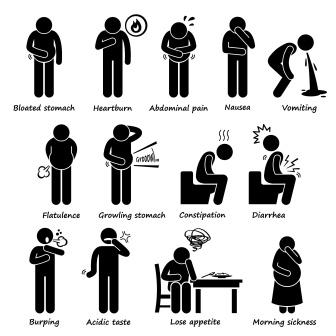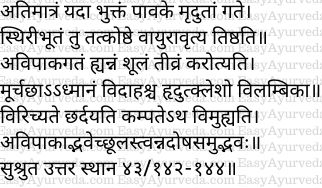Avipakaja Shoola Symptoms, Treatment
By Dr Raghuram Y.S. MD (Ay) & Dr Manasa, B.A.M.S
Avipakaja Shula means pain caused due to indigestion of food. It is also called by the name anna dosha samudbhava shula i.e. pain in the abdomen caused by contaminated food or food afflicted by doshas. Avipaka – indigestion, Shula – pain / colic
Master Sushruta has explained this painful condition and considered it as one among the different types of shoola – colic / pain in the abdomen.
Read – Shoola Types, Symptoms, Treatment, Medicines, Remedies

Table of Contents
Causes
Excessive consumption of food is said to be the causative factor of this condition. ‘Excessive food’ here means ‘consumption of food in a quantity of what is more than required or more than one’s capacity’.
We all tend to overeat at times. But everyone who has consumed excessive food need not suffer from this condition.
Master Sushruta further specifies that ‘consumption of excessive food in the presence of weak digestion’ is the cause of avipaka shula.
Master Vagbhata also has quoted that ‘almost all diseases are caused due to sluggish digestive capacity / weak digestive fire, mainly the abdominal disorders’. Colic explained in avipaka shula also occurs in the abdomen.
Weak digestive fire is the major cause of many systemic disorders. Kaya Chikitsa is a branch of Ayurveda which aims at curing diseases by correcting the digestive fire and its subunits in the body.
Digestive fire might get weak when we consume excessive food in contrast to what and how much we need as per our capacity and constitution. Excessive food consumption is one of the most important causes for indigestion of food. Therefore it is also a direct as well as an indirect cause for abdominal pain also.
We may consider excessive food intake in relation to abdominal colic in two ways –
- Excessive consumption of food in presence of weak digestive fire will lead to indigestion and subsequent manifestation of abdominal pain.
- Excessive food consumption as a regular practice can cause weakness of digestive fire. This weak fire will not have the capacity to digest food properly. Undigested food remains and gets stagnated in the gut and causes pain.
In a way putting these two conditions together the colic caused by excessive consumption of food might be a cyclic process wherein the same chain of events keep repeating by themselves if not addressed properly.
Read – Annadrava Shoola: Definition, Treatment, Remedies
Pathogenesis
- The food which has been consumed in excess of one’s capacity would get stagnated in the colon due to the sluggishness of digestive fire.
- The stagnated food gets matted and adhered to the walls of the colon
- Consequentially vata gets aggravated
- The aggravated vata envelopes and blocks this inadequately digested food (in the upper colon) and feces (in the lower colon)
- This undigested food blocked by the aggravated vata will produce severe pain in the abdomen and this condition is called as avipakaj shoola
Read – Parinama Shoola : Definition, Types, Treatment, Medicines
Symptoms
Tivram shulam – severe pain in the abdomen
Murcha – fainting
Adhmanam – distension of abdomen
Vidaha – burning sensation in the abdomen
Hrdaya utklesha – nausea / discomfort in the cardiac (heart) region
Vilambika – the food contaminated by aggravated kapha and vata will get stagnated in the middle part of the gut without getting eliminated either from the upper or lower passages (mouth or anus)
Virechana – diarrhea
Chardi – vomiting
Kampana – tremors
Moha – confusion
Avipaka – indigestion
Read – Indigestion Causes, Symptoms, Treatment
Sanskrit Verses

Treatment
Vamana – therapeutic emesis
Langhanam – fasting / lightening therapies
Swedanam – sudation
Pachanam – ama digesting measures, medicines and diet
Phalavarti – suppositories
Kshara – Alkali
Churna – Herbal powders
Gutika – Herbal tablets
It is very important to treat these painful conditions after having considered the different etiological factors, constitution of the patient, predominance of dosha, geography, time period etc factors.
Read – Roga, Rogi Pareeksha: Examination Of Disease And Patient
Other treatment
This condition shall be treated on the lines of –
Treating ajirna i.e. indigestion (since indigestion is the main cause of this pain)
Deepana-pachana – medicines and diet for correcting digestive fire and also to destroy ama
Vamana and virechana – therapeutic emesis and purgation to throw out the contaminated Doshas and also to cleanse the gut, strengthen the organs and prevent recurrences
Shula chikitsa – treating abdominal pain
Pathya kalpanas – thin digestible gruels which are prepared with appetizing and ama digesting herbs and also light to digest
Read – Importance Of Diet (Pathya) For Specific Diseases
Modern correlation
Pain in the abdomen mild to moderate intensity has been mentioned among the symptoms of indigestion even in modern texts.
Other symptoms of indigestion include –
Early fullness during a meal, bloating and uncomfortable fullness after a meal, explained as adhmana and vilambika in Ayurveda amongst the symptoms of avipakaja shula
Discomfort in the upper abdomen which also includes pain
Burning sensation in the upper abdomen explained as vidaha
Nausea and vomiting explained as hrit utklesha and chardi
Heartburn explained as hrdaya utklesha
There are many causes for indigestion. Overeating or eating food too quickly has been mentioned as one of the causes of indigestion even in modern texts. Avipakaj Shool appears to be the explanation of abdominal pain due to this cause. Causes also include certain abdominal disorders like gastritis, peptic ulcers, celiac disease, constipation, intestinal blockage, pancreatitis, intestinal ischemia etc. therefore indigestion may not only be the cause but also the effect of other conditions.
Click to Consult Dr Raghuram Y.S. MD (Ayu)









